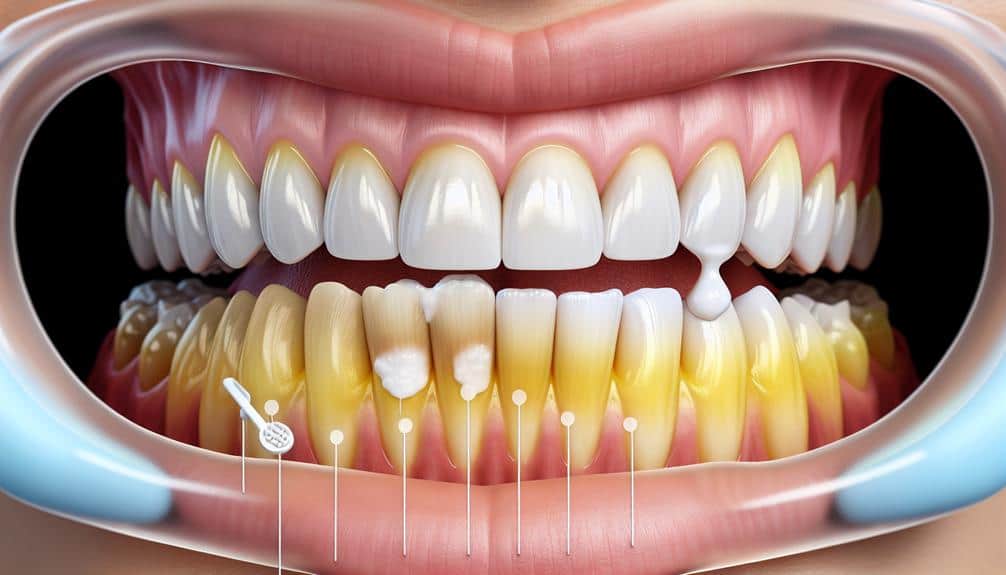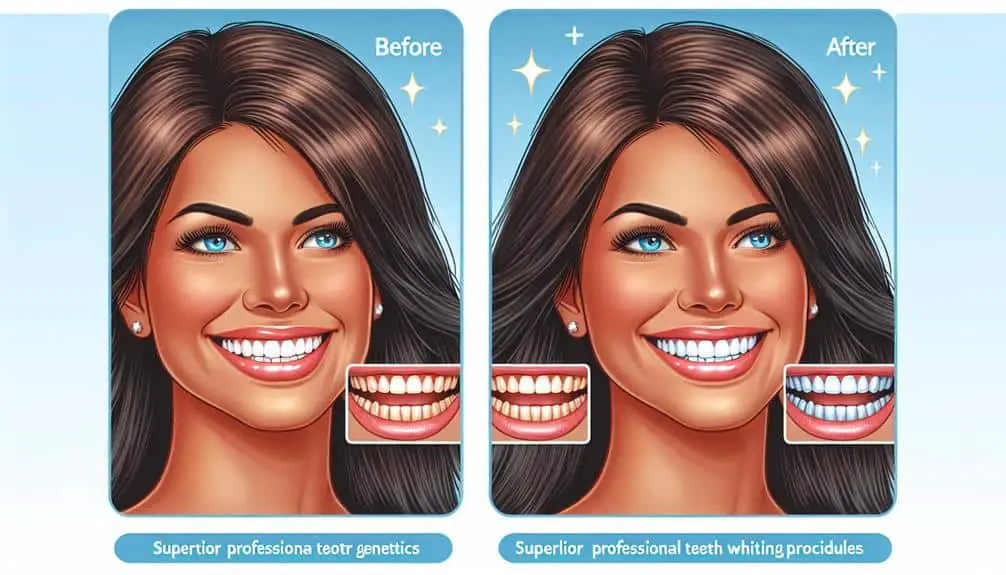When it comes to genetic tooth staining, consider professional whitening procedures like in-office bleaching or laser treatments for quick, effective results. At-home whitening kits offer a cost-effective alternative with whitening gel and trays. Dental veneers provide a long-lasting solution, lasting 10-15 years with proper care. Lifestyle changes such as regular brushing, wise dietary choices, and avoiding tobacco products can also help maintain a bright smile. Exploring these top treatment solutions can help you achieve the stain-free smile you desire. Additional details on each option are available to help you make an informed decision.
Key Points
- Consider professional whitening procedures for efficient results.
- Explore at-home whitening kits as a cost-effective option.
- Opt for dental veneers for long-lasting stain solutions.
- Implement lifestyle changes for maintaining a bright smile.
- Consult with a dentist to tailor treatment based on genetic factors.
Understanding Genetic Tooth Staining
If you have ever wondered why some individuals experience genetic tooth staining, understanding the underlying causes is important for effective treatment solutions. Genetic factors play a significant role in enamel discoloration, leading to variations in tooth color among individuals. Enamel discoloration occurs when the outer layer of the tooth, the enamel, is affected by genetic factors that influence its development and mineralization.
Genetic tooth staining can manifest in various ways, such as white spots, yellowing, or even brown discoloration. These issues are often challenging to address through regular oral hygiene practices alone due to their genetic nature. Understanding the specific genetic factors at play can help dental professionals tailor treatment solutions to each individual's needs effectively.
Enamel discoloration linked to genetic factors may require specialized treatments that go beyond traditional whitening methods. By identifying the underlying genetic causes of tooth staining, dental professionals can develop personalized treatment plans that target the root of the issue, providing more lasting and satisfactory results for patients seeking to address genetic tooth staining.
Professional Whitening Procedures
Professional whitening procedures are commonly sought after to effectively address genetic tooth staining concerns. In-office bleaching techniques and laser whitening treatments are two professional options available for individuals looking to enhance the brightness of their teeth.
In-office bleaching procedures involve the application of a bleaching agent directly onto the teeth, which is then activated by a light source to accelerate the whitening process. This method is performed under the supervision of a dental professional, ensuring safety and best results.
On the other hand, laser whitening treatments utilize a laser to enhance the effectiveness of the whitening gel applied to the teeth, providing a quicker and more efficient way to achieve a brighter smile.
Both in-office bleaching techniques and laser whitening treatments offer significant advantages in terms of speed and effectiveness compared to at-home whitening kits. Consulting with a dentist can help determine the most suitable professional whitening procedure based on individual needs and preferences.
At-Home Whitening Kits
Consider incorporating at-home whitening kits as a convenient solution for addressing tooth staining concerns in the comfort of your own space. These kits typically contain whitening gel and trays that mold to your teeth for effective treatment. They offer a cost-effective alternative to professional procedures, allowing you to whiten your teeth at your convenience. When using at-home whitening kits, follow the instructions carefully to achieve best results and avoid potential sensitivity issues.
DIY remedies and natural alternatives are also gaining popularity for those looking to address tooth staining in a more holistic manner. Some people opt for baking soda or activated charcoal to gently remove stains from the teeth. However, it's important to be cautious with these methods, as they may not be suitable for everyone and could potentially damage tooth enamel if used incorrectly.
Before choosing an at-home whitening kit or trying any DIY remedies, consult with your dentist to make sure they're safe for your teeth and gums. Remember, maintaining good oral hygiene practices is critical for keeping your teeth healthy and vibrant.
Dental Veneers for Stains
For individuals looking for a long-lasting solution to tooth staining, dental veneers offer a durable and aesthetically pleasing option. Veneers are thin shells made of porcelain or composite resin that are custom-made to cover the front surface of your teeth, concealing stains and improving the overall appearance of your smile.
To explore further into the world of dental veneers for stains, here are some key points to keep in mind:
- Veneer alternatives: While dental veneers are a popular choice for treating tooth stains, options such as dental bonding or crowns may also be taken into account based on the extent of staining and individual preferences.
- Stain prevention: Once you have dental veneers, maintaining good oral hygiene practices is crucial to prevent future staining. Regular brushing, flossing, and dental check-ups can help prolong the lifespan of your veneers.
- Longevity: Dental veneers typically last between 10-15 years, providing a durable solution for genetic tooth staining. Proper care and maintenance can further extend the lifespan of your veneers, ensuring a lasting bright smile.
Lifestyle Changes for Brighter Smiles
Implementing healthy habits like regular brushing and flossing can greatly contribute to achieving and maintaining a brighter smile. In addition to oral hygiene habits, making smart dietary choices plays a pivotal role in keeping your teeth looking their best. Foods and drinks that are known to stain teeth, such as coffee, tea, red wine, and dark berries, should be consumed in moderation. Opt for teeth-friendly options like crunchy fruits and vegetables that can help naturally clean your teeth while providing essential nutrients.
Furthermore, habits like smoking and using tobacco products can lead to severe tooth discoloration over time. Quitting these habits not only improves your overall health but also prevents further staining of your teeth. Regular dental check-ups and professional cleanings are essential in maintaining a bright smile. Dentists can remove stubborn stains and provide personalized advice on how to enhance your oral care routine.
Frequently Asked Questions
Are There Any Alternative Treatments for Genetic Tooth Staining Besides the Ones Mentioned in the Article?
If you're looking for alternative treatments for genetic tooth staining beyond what's mentioned, consider natural remedies like oil pulling or baking soda. Lifestyle changes such as avoiding staining foods can also help improve tooth discoloration.
How Long Do the Results of Professional Whitening Procedures Typically Last?
Professional whitening procedures typically last around 6 months. To maintain results, brush and floss regularly, avoid staining foods, and see your dentist for touch-ups. While costlier than at-home options, professional whitening offers longer-lasting, more effective results.
Are At-Home Whitening Kits Safe for Individuals With Sensitive Teeth?
When dealing with tooth sensitivity, it's important to think about whitening safety. At-home kits can be safe for individuals with sensitive teeth, but it's advisable to consult a dentist for personalized recommendations and guidance.
Can Dental Veneers Be Used to Cover up Genetic Tooth Staining on All Teeth or Only Specific Ones?
Dental veneers are effective in covering genetic tooth staining on all teeth. They can be expensive, but offer a long-term solution. Maintenance is essential for veneers to last. Consult with a dentist to determine the best option for you.
Are There Any Specific Dietary Changes That Can Help Prevent or Reduce Genetic Tooth Staining?
Looking to prevent or reduce genetic tooth staining through dietary changes? Consider incorporating holistic approaches and natural remedies into your routine. Lifestyle modifications can play a key role in maintaining ideal oral health.



